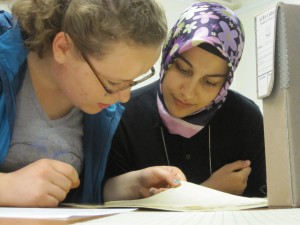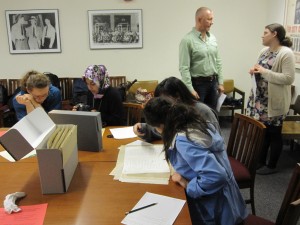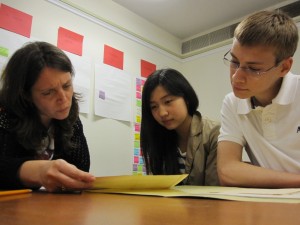ALBA Institute New Jersey teachers on track

High school students from Bergen Academies explore the ALBA collection at NYU’s Tamiment Library. Photo credit: Juan Salas
Hurricane Sandy swamped the schools of Bergen County, New Jersey last November, forcing postponement of ALBA’s teaching institute, but the spring term brought an exciting revival as 22 Spanish language and social studies high school educators attended a lively one-day session at the Bergen County Academies, organized by administrator Tim Casperson, in Hackensack.
Sergei Alschen and Gabriella Calandra, two New Jersey “alumni” of earlier institutes, provided power point presentations of their interdisciplinary high school course on Activism, explaining to their colleagues how ALBA’s Spanish Civil War curricula prepare students to undertake their own projects on past and present activism. (The two had made a similar presentation last March, leading a session on Teaching Activism at a two-day conference sponsored by the Museum of the City of New York, home of the Puffin Gallery History of Activism exhibition.)
ALBA’s instructors came to the session armed with documentary sources that included letters written home by volunteers in the Abraham Lincoln Brigade, transcriptions of postwar interviews, public documents (including President Franklin D. Roosevelt’s “Quarantine Speech” and the U.N. Declaration of Human Rights) as well as a wide range of Spanish and English literary sources for use in language courses. In addition, Sebastiaan Faber projected a series of photo and poster images, explaining to teachers how visual sources can be used to supplement and expand the use of written historical documents.
One series of Spanish Civil War posters and drawings directed attention to the human rights issues associated with that war—bombing, civilian casualties, refugees—and linked those issues to similar visual representations in current international crises. Such documentary sources then provided teachers with opportunities to discuss the ethical and moral dimensions of historical and political decisions.
Most interesting, from 9 a.m. to 3 p.m., even through the lunch break, the discussions never stopped. New Jersey teachers affirmed what ALBA has seen in school districts throughout the country: enthusiasm and gratitude among teachers for being introduced to a topic that is seldom taught and yet fits perfectly into the common core standards currently being introduced into high school education.
The results came in blind surveys written by the teachers at the end of the day: A social studies teacher with 14 years in the classroom wrote: “one of the best experiences I have had with school content, great and practical resources, and freedom to develop ideas.” Other teachers put it another way: “wonderful”; “fantastic”; “amazing”; “professional”; “excellent.” Not a sorry note in the lot!
Four weeks later, ALBA brought the professional development program back to Tampa, Florida, the fourth time, organized by ALBA Vice Chair Fraser Ottanelli, head of the history department at the University of South Florida and by social studies administrator Dennis Holt. This time World History and US History were on the agenda, and ALBA won the same plaudits as in New Jersey. And in Oberlin, Ohio, Spanish Professor Faber organized a two-day program with institute alumni to explore ways of expanding ALBA’s role in the new common core curricula. More details follow in the next issue.
Peter N. Carroll chairs ALBA’s committee on education.
















